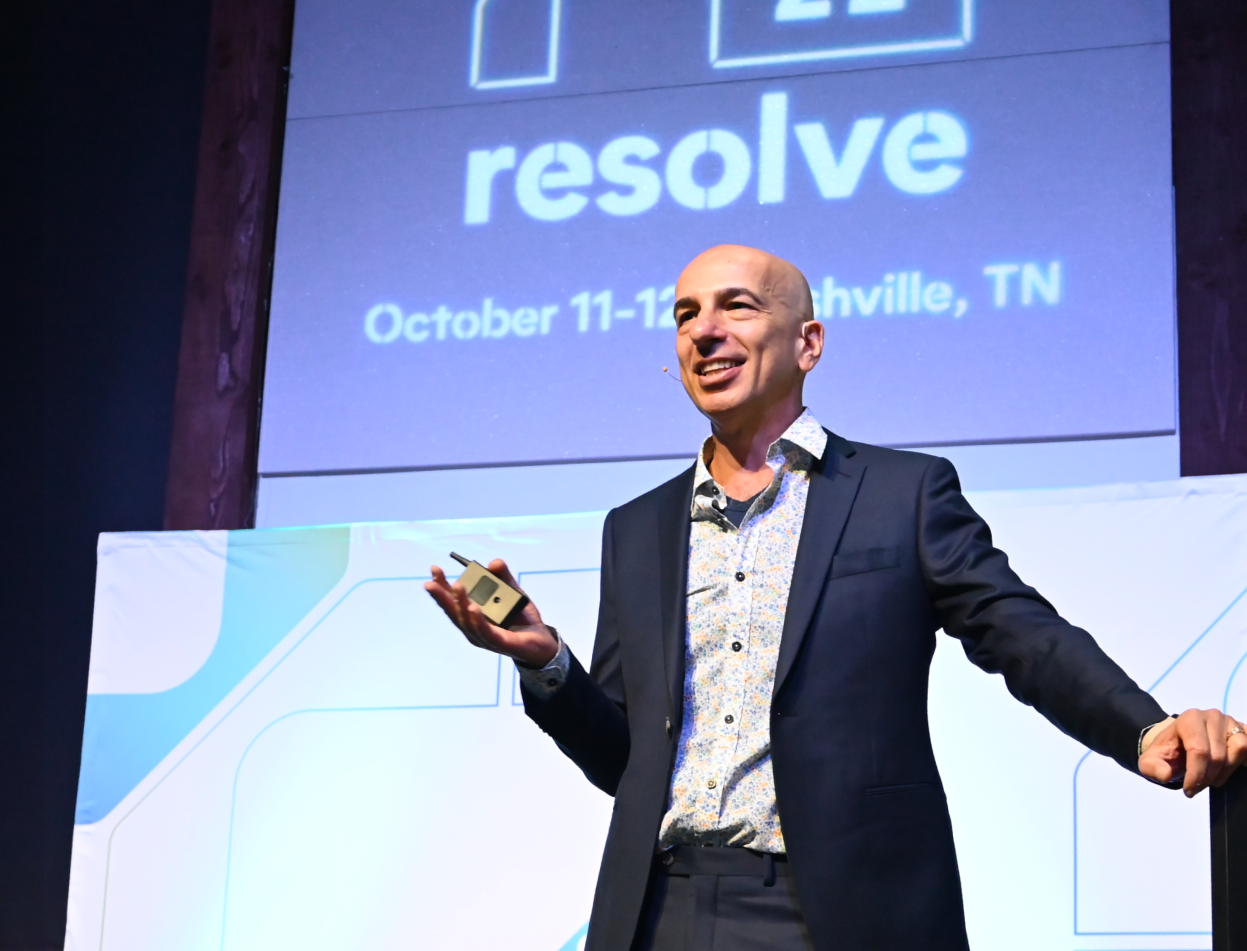In the latest episode of Dialed In, Brad Lightcap, COO of OpenAI, joined Gadi Shamia for a discussion about AI, ChatGPT models, safety, and the impact of these technologies on the world. The conversation was held live in Nashville during Resolve 23, and it provided valuable insights into the inner workings of GPT models and OpenAI’s mission.
Listen to the full episode here.
Topics covered in the episode include:
The GPT Revelation: AI Before and After November 2022. The conversation started with Gadi Shamia’s question about the unexpected impact of ChatGPT, which was launched in November 2022. Brad admitted that, in retrospect, the success of ChatGPT was not surprising, but at the time, the subtle change in making the model more conversational wasn’t expected to have such a significant impact. ChatGPT’s ability to mimic human language and provide rich, useful answers was a game-changer, redefining how we interact with AI.
OpenAI’s first and foremost commitment is to ensure that the data used for training AI models is representative of the world and embodies important values such as democratic principles, human rights, and ethical considerations. They believe it’s vital to make AI models appreciate these values from the beginning. Brad suggests that AI models are essentially blank slates and need a post-training process to behave according to predefined guidelines.
Ensuring Safety and Avoiding Biases. One of the most critical aspects discussed in the interview was safety. Brad explained how OpenAI’s mission includes building artificial general intelligence that is safe and benefits all of humanity. They focus heavily on the safety of their AI models. When they trained GPT-4, they spent several months making sure it was safe to use.
To ensure safety, OpenAI uses a reward function that provides positive reinforcement for correct behavior and negative reinforcement for incorrect behavior. This process involves teaching the model what is acceptable and what is not. They work with experts from various domains to fine-tune the model’s behavior, ensuring it respects users and maintains civil discourse.
Moreover, the distribution of information on the internet plays a role in determining truthfulness. Topics well-represented on the internet, like state capitals, are easier to verify. OpenAI can infer a source of truth based on data distribution. For less common or nuanced information, OpenAI uses evaluation sets to identify knowledge gaps and improve the model’s accuracy over time.
Teaching GPT to be “Mostly True.” In response to Gadi’s question about how they make their models “mostly true,” Brad explained that they teach GPT through examples and feedback. They give the model correct and incorrect answers, effectively fine-tuning it. The process of teaching the model to be correct about one fact can increase its overall correctness on related topics. This method leverages the model’s ability to reason and adapt its responses based on the information it’s given.
OpenAI is keen on evolving the ways people interact with AI. This includes text-based interaction, image inputs, voice-based conversations, and visual recognition. Brad emphasizes the importance of building AI systems that can mimic human sensory experiences, thus enabling a more natural and intuitive interaction with AI.
Reference to a Source of Truth Data. To ensure factual correctness, OpenAI encourages users to treat GPT models as reasoning engines on top of a source of truth data. Rather than expecting the model to memorize facts, users should employ it to reference data and provide accurate responses based on that data. This concept is known as “retrieval.” OpenAI encourages users to have a reliable source of truth and use the model to reference that data and reason to provide accurate answers.
Brad highlights the diverse applications of AI and the rapid growth in its adoption across various sectors. He underscores that AI, as a tool, can be applied to countless problems and industries, indicating the potential for AI to contribute to global challenges
Guarding Against Outside Influence. Gadi raised a crucial question about preventing outside influence on AI models, citing instances where models in China had to reflect certain political narratives. Brad highlighted the importance of providing AI with a source of truth data and maintaining control over the data to which the model refers. By keeping the AI grounded in authoritative, objective sources, OpenAI aims to reduce the risk of external bias or manipulation.
The interview provided valuable insights into the safety, accuracy, and development of GPT models, emphasizing OpenAI’s commitment to creating AI that benefits humanity and operates with transparency and integrity. It’s evident that the responsible use of AI and continuous improvement are central to OpenAI’s mission. The conversation shed light on how advanced AI technologies are being harnessed to improve human interactions and information access while prioritizing ethics and safety.
OpenAI’s Approach to Data and Values: Guarding Against Authoritarian Uses: Brad acknowledges the concern about authoritarian regimes attempting to shape AI models to serve their interests. OpenAI firmly opposes such practices, focusing on giving individuals more control over how AI models relate to them and express their values, reducing the risk of centralizing control over these models.
OpenAI’s primary role is to push the boundaries of AI intelligence, focusing on building the smartest models possible. They aim to provide tools and primitives to developers and enterprises to harness AI’s capabilities, ensuring that the technology is accessible and adaptable for a wide range of applications.
In summary, this highly relevant discussion sheds light on OpenAI’s mission, its vision for AI development, the role of AI in various sectors, and its commitment to ethical AI use. OpenAI aims to provide cutting-edge AI technology while being mindful of its potential consequences and striving to ensure a responsible and positive impact on society.
Listen to the full episode here.
 First Notice of Loss
First Notice of Loss 




